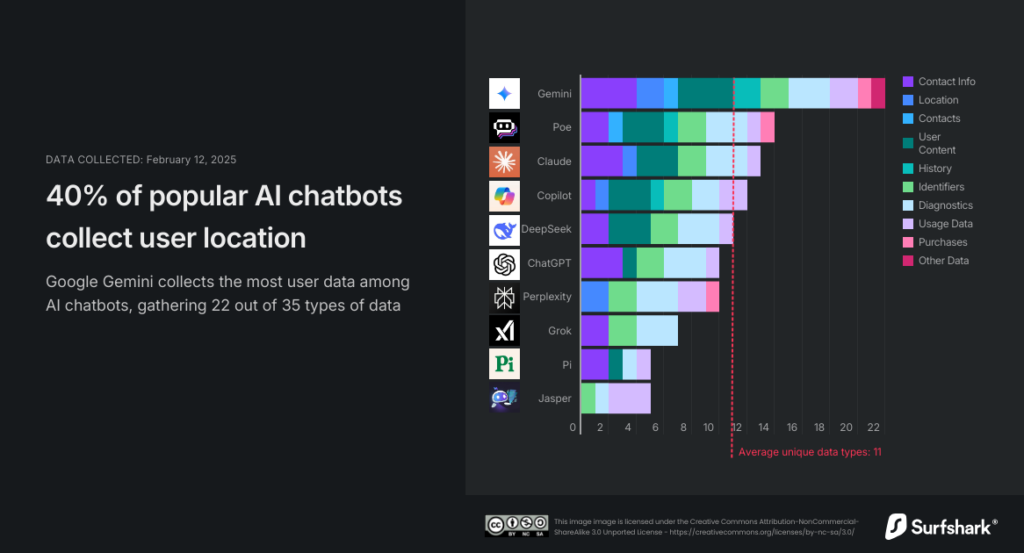AI chatbots are everywhere—answering our questions, assisting with work, and even giving life advice. But have you ever stopped to think about what information they collect from you?
A recent analysis of the top 10 AI chatbots on the Apple App Store reveals that privacy might just be an illusion.
📌 Key finding: Every chatbot analyzed collects some form of user data, with an average of 11 types of data out of 35 possible categories. Many also track user locations and link data to third parties for targeted advertising.
Let’s dive into the most alarming insights from this study and why you should care.

Google Gemini Wins (But Not in a Good Way)
If you thought social media was bad at data collection, meet Google Gemini, the undisputed king of information hoarding.
🔎 Gemini collects 22 out of 35 possible data types, including:
✅ Precise location data (only Gemini, Copilot, and Perplexity collect this)
✅ Name, email, phone number
✅ Search and browsing history
✅ Your phone’s contact list
✅ User-generated content and more
In other words, Gemini doesn’t just know what you ask—it knows who you are, where you are, and who you talk to. For privacy-conscious users, this could be seen as excessive and intrusive.
ChatGPT: Less Intrusive, But Not Perfect
📌 ChatGPT collects 10 types of data, including:
- Contact information
- User content
- Identifiers and usage data
💡 The good news? ChatGPT does not track data or use third-party advertising. It also offers temporary chats(deleted after 30 days) and allows users to request data removal from training models.
However, since it still stores chat history and other data, users should review its privacy policy to understand how their information is handled.
The Worst for Privacy: Jasper, Copilot, and Poe Track You
📢 If you’re worried about your data being sold to third parties, steer clear of Copilot, Poe, and Jasper.
📌 Jasper is the worst offender, as it not only collects device IDs, but also:
✅ Product interaction data
✅ Advertising data
✅ “Any other data about user activity in the app” (very vague and concerning)
This data can be sold to data brokers or used for targeted ads. If you use these apps, your information might already be circulating in the data market.
DeepSeek: The Chatbot With the Worst Security Breach
📌 DeepSeek falls somewhere in the middle, collecting 11 types of data, including chat history. However, there’s a huge red flag: it stores data on servers in China.
⚠️ Major issue: In 2025, DeepSeek suffered a massive data breach, exposing over 1 million records, including:
- Chat histories
- API keys
- Confidential user information
🔴 What does this mean for you? Even if AI chatbots promise security, stored data is always at risk of being hacked.
What Can You Do?
🔒 Stay vigilant. While data collection is unavoidable, you can control how much you share. Here’s how:
✔️ Read the privacy policy before installing a chatbot.
✔️ Use private modes or temporary chats when available.
✔️ Disable location access and other unnecessary permissions.
✔️ Avoid sharing sensitive information with AI chatbots.
Final Verdict: Are AI Chatbots Worth the Risk?
AI chatbots are incredibly useful, but they are also data collection machines.
- Google Gemini collects the most information (and it’s a lot).
- Copilot, Poe, and Jasper track and sell your data.
- DeepSeek has already suffered a massive security breach.
The question isn’t whether AI chatbots collect data, but how much privacy you’re willing to sacrifice for convenience.
📢 Takeaway: If privacy matters to you, choose your chatbot carefully and take steps to limit data exposure.
Source: Surfshark

